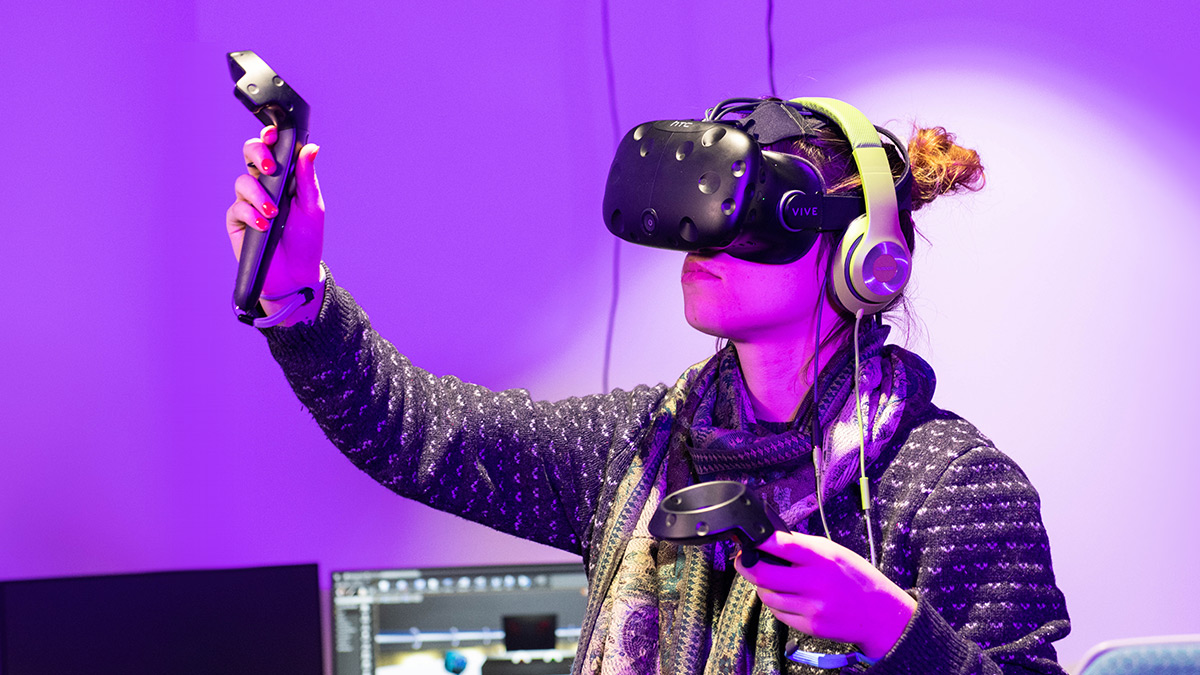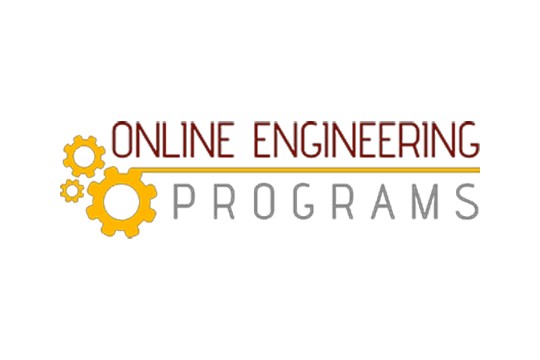Human-Computer Interaction Master of Science Degree

Human-Computer Interaction
Master of Science Degree
- RIT /
- Rochester Institute of Technology /
- Academics /
- Human-Computer Interaction MS
Design intuitive tech experiences by studying how people interact with websites, software, and systems in RIT’s HCI master’s.
$113.8K
Average First-Year Salary of RIT Graduates from this degree
8th
Fastest growing job by 2030: UX Designer
Overview for Human-Computer Interaction MS
Explore the design methods, evaluation, and implementation of interactive computing systems for human use. Building on decades of research in psychology and human behavior, the human-computer interaction master’s degree focuses on the skills needed by user-experience researchers and computing professionals, including observing how people interact with websites and software and the design new technologies to help them accomplish their goals. With computing moving rapidly away from the traditional desktop, companies need professionals that understand how evolving technologies can be designed to be intuitive, effective, and compelling for users.
RIT’s Human-Computer Interaction Master’s Degree: On-Campus or Online
Human-computer interaction (HCI) addresses the design, evaluation, and implementation of interactive computing and computing-based systems for the benefit of human use. HCI research is driven by technological advances and the increasing pervasiveness of computing devices in our society. With an emphasis on making computing technologies more user-friendly, HCI has emerged as a dynamic, multifaceted area of study that merges theory from science, engineering, and design—as well as concepts and methodologies from psychology, anthropology, sociology, and industrial design—with the technical concerns of computing.
The human-computer interaction master’s degrees provides the knowledge and skills necessary for conceptualizing, designing, implementing, and evaluating software applications and computing technologies for the benefit of the user, whether the user is an individual, a group, an organization, or a society. Human, technological, and organizational concerns are interwoven throughout the curriculum and addressed in team- and project-based learning experiences.
Human-Computer Interaction Curriculum: Packed with High-Demand Skills
- Research: Demand for user research skills is growing 35%, and carries a competitive advantage in the marketplace.
- UI/UX: Information architecture skills carry a salary premium in the workforce.
- Design Thinking: Demand for design thinking skills is growing 112%.
- Development: Demand for front-end development skills is growing 12% and carries a salary premium.
Human-Computer Interaction Master's Courses
The core courses provide knowledge and skills in the conceptual and methodological frameworks of HCI and HCI research. Emphasis is on understanding human cognition as it applies to information systems plus interaction design, interface prototyping, and usability evaluation.
Program Electives: Students select two elective courses. In select cases, students can petition for approval to include a course complementary to the degree program as a program elective.
Application Domain Courses:To gain breadth in a technical area to which HCI concepts can be applied, students complete two courses in any of the application domain areas. A special topics option is also available, with faculty approval, for individuals with interest in other HCI-related areas.
- e-Learning Technologies–The recent boom in online learning has created a need for professionals to design such systems. Students learn the fundamentals of instructional technology and interactive courseware.
- Geographical Information Science and Technology–Research how digital technology is revolutionizing how humans view earth with topics in thematic cartography and geographic visualization.
- Self-defined Application Domain–Design your own concentration.
- Smart Device Application Design and Development–Smart devices are no longer limited to phones. Design and study human interaction with cutting-edge mobile technology.
- Web Development–Study the foundations of web technologies, enabling students to better understand how The Internet can be built to improve the experience of a diverse range of end-users.
Thesis/Capstone Project: Students may complete a thesis or capstone project. This experience is meant to be an empirical study of a HCI problem, which can be the development of a software product through user-centered design processes. The results are either published in a peer-reviewed journal or publicly disseminated in an appropriate professional venue.
-
Affordable Now. Valuable for Life.
Earn your master’s degree without the full price tag. With Master Up you can receive a 30% tuition scholarship for an RIT master’s degree.
-
Don't Delay Your Ambitions Until the Fall
This program offers a spring start, which means you can jumpstart your graduate journey and begin your studies this January.
-
Meet us on-campus on February 19
Learn about the programs that interest you. Hear from program faculty, speak with current graduate students, and ask the questions that will help you get one step closer to your career goals.
Careers and Experiential Learning
Typical Job Titles
| User Experience Researcher | UI/UX Designer | Interaction Designer |
| Usability Specialist | Entrepreneur | Frontend Developer |
| Mobile Applications Designer | Product Designer | Research Associate |
| Senior Software Engineer | UX/UI Developer |
Cooperative Education
What makes an RIT education exceptional? It’s the ability to complete relevant, hands-on career experience. At the graduate level, and paired with an advanced degree, cooperative education and internships give you the unparalleled credentials that truly set you apart. Learn more about graduate co-op and how it provides you with the career experience employers look for in their next top hires.
Cooperative education is optional but strongly encouraged for graduate students in the human-computer interaction program.
Creative Industry Day
RIT’s Office of Career Services and Cooperative Education hosts Creative Industry Day, which connects students majoring in art, design, film and animation, photography, and select computing majors with companies, organizations, creative agencies, design firms, and more. You'll be able to network with company representatives and interview directly for open co-op and permanent employment positions.
Featured Work and Profiles
-
iSchool faculty and students organize, present at 2025 ACM Computers and Accessibility (ASSETS) Conference
Five iSchool faculty members and students helped organize this year’s ASSETS conference and presented research focused on accessibility.
Read More about iSchool faculty and students organize, present at 2025 ACM Computers and Accessibility (ASSETS) Conference -
AIR Lab researchers combine AR, VR and AI to advance accessibility
Faculty and students develop tools to support job training processes for neurodivergent individuals.
Read More about AIR Lab researchers combine AR, VR and AI to advance accessibility -
Video: RIT Computing Graduate Students Thrive in Academia and Industry
Learn more about our leading research opportunities and state-of-the-art facilities in this new video.
Read More about Video: RIT Computing Graduate Students Thrive in Academia and Industry -
Caption Mask
Tae Oh Caption Mask is one of the famous booths in ImagineRIT 2022. The caption mask project started in the classroom and they presented in the hospital and showing the possibility of their research in the...
Read More about Caption Mask -
One Button PIN: A Single Authentication Method for Blind and Low Vision Users
Garreth Tigwell, Roshan Peiris Prof. Garreth Tigwell, Prof. Roshan Peiris, and their team won the Best Paper Award at Mobile HCI 2022!
Read More about One Button PIN: A Single Authentication Method for Blind and Low Vision Users -
A Lasting Impact in Accessibility and Usability
Faculty Emerita Vicki Hanson Although Vicki Hanson stepped away from her full-time faculty role within the School of Information more than three years ago and has since become the Chief Executive Officer of the Association for...
Read More about A Lasting Impact in Accessibility and Usability
Curriculum for 2025-2026 for Human-Computer Interaction MS
Current Students: See Curriculum Requirements
Note for online students
The frequency of required and elective course offerings in the online program will vary, semester by semester, and will not always match the information presented here. Online students are advised to seek guidance from the listed program contact when developing their individual program course schedule.
Students are also interested in
Admissions and Financial Aid
This program is available on-campus or online.
On Campus
| Offered | Admit Term(s) | Application Deadline | STEM Designated |
|---|---|---|---|
| Full-time | Fall or Spring | Fall - February 15 priority deadline, rolling thereafter; Spring - rolling | Yes |
| Part-time | Fall or Spring | Rolling | No |
Online
| Offered | Admit Term(s) | Application Deadline | STEM Designated |
|---|---|---|---|
| Part-time | Fall or Spring | Rolling | No |
Full-time study is 9+ semester credit hours. Part-time study is 1‑8 semester credit hours. International students requiring a visa to study at the RIT Rochester campus must study full‑time.
Application Details
To be considered for admission to the Human-Computer Interaction MS program, candidates must fulfill the following requirements:
- Complete an online graduate application.
- Submit copies of official transcript(s) (in English) of all previously completed undergraduate and graduate course work, including any transfer credit earned.
- Hold a baccalaureate degree (or US equivalent) from an accredited university or college. A minimum cumulative GPA of 3.0 (or equivalent) is recommended.
- Satisfy prerequisite requirements and/or complete bridge courses prior to starting program coursework.
- Submit a current resume or curriculum vitae.
- Submit a personal statement of educational objectives.
- Submit two letters of recommendation.
- Entrance exam requirements: GRE optional for Spring 2026 and Fall 2026 applicants. No minimum score requirement.
- Submit English language test scores (TOEFL, IELTS, PTE Academic, etc.), if required. Details are below.
English Language Test Scores
International applicants whose native language is not English must submit one of the following official English language test scores. Some international applicants may be considered for an English test requirement waiver.
Duolingo (DET): 130
IELTS: 6.5
LanguageCert Academic: 74
PTE Academic: 60
TOEFL: 88
International students below the minimum requirement may be considered for conditional admission. Deaf and hard-of-hearing test takers with significant hearing loss do not need to take the listening and speaking sections for the TOEFL and IELTS. Each program requires balanced sub-scores when determining an applicant’s need for additional English language courses.
How to Apply Start or Manage Your Application
Cost and Financial Aid
An RIT graduate degree is an investment with lifelong returns. Graduate tuition varies by degree, the number of credits taken per semester, and delivery method. View the general cost of attendance or estimate the cost of your graduate degree.
A combination of sources can help fund your graduate degree. Learn how to fund your degree
Additional Information
Prerequisites
The program requires strong technical and social science skills. Knowledge of quantitative statistical methodologies is important since students review research studies as well as analyze the results of their own usability evaluations. Students are also expected to have a solid background in computer programming. These competencies may be demonstrated by previous course work, technical certifications, or comparable work experience. Bridge courses are available to fulfill any gaps in an applicant's qualifications. Applicants will be made aware of any areas where additional course work may be necessary.
Online Degree Information
The Human-Computer Interaction MS program is designed to be completed part-time (1 or 2 courses per term). Full-time options may be available with Graduate Program Director's approval. Time to completion will depend on the student’s individual plan of study, when courses are offered, what electives are selected, and if the student takes a summer course. Advisors work closely with students after admission on course registration. Typically students finish this degree in 2 years. For specific details about the delivery format and learning experience, contact the Program Contact listed on this page. RIT does not offer student visas for online study.
Online Tuition Eligibility
The online Human-Computer Interaction MS is a designated online degree program that is billed at a 43% discount from our on-campus rate. View the current online tuition rate.
Online Study Restrictions for Some International Students
Certain countries are subject to comprehensive embargoes under US Export Controls, which prohibit virtually ALL exports, imports, and other transactions without a license or other US Government authorization. Learners from the Crimea region of the Ukraine, Cuba, Iran, North Korea, and Syria may not register for RIT online courses. Nor may individuals on the United States Treasury Department’s list of Specially Designated Nationals or the United States Commerce Department’s table of Deny Orders. By registering for RIT online courses, you represent and warrant that you are not located in, under the control of, or a national or resident of any such country or on any such list.
Accreditation
Related News
-
October 21, 2025

RIT faculty and students win Best Original Design at international charity competition
A multidisciplinary team of students and faculty continued an RIT tradition of participating in Canstruction Rochester by making EVE from WALL-E out of more than 2,400 canned goods.
-
May 16, 2025

West Henrietta’s Token launches smart ring to combat cybersecurity threats
Rochester Business Journal highlights the growth of Token, a smart ring built to prevent cyberattacks, which uses technology developed by Steve Shapiro '04 (human computer interaction) and Melanie Shapiro '08 (MBA).
-
February 7, 2025

Online UX Design Degree Programs
OnlineEngineeringPrograms.com interviewed Roshan Peiris, assistant professor in the School of Information, about the field of user experience (UX) design.
Contact
- G Jackson Gagnier
- Assistant Director, Graduate Admissions
- Office of Graduate Admissions
- Enrollment Management
- 585‑475‑6768
- gjgges@rit.edu
- Kristen Shinohara
- Graduate Program Director
- School of Information
- Golisano College of Computing and Information Sciences
- 585‑475‑6197
- kristen.shinohara@rit.edu
School of Information





















